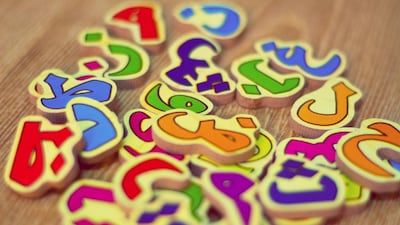Last year, I left work in the UAE to study Arabic full-time in Oman. After almost two decades in the Arabian Gulf, I decided it was time.
When I first arrived from Canada at the age 13, Arabic wasn’t offered to me at school. I was told I was too old to learn the language and I should focus on GCSE French. I didn’t mind. I only planned to stay a couple of years in the Gulf.
Years passed. I picked up what academics call Gulf Pidgin Arabic or “taxi Arabic”, a mish mash of Arabic, English, Urdu and Hindi spoken by South Asian labourers, maids and shopkeepers. I had a smattering of Emirati words from majlis sessions but no grammar on which to hang these nouns.
Occasional attempts to fill in the gaps failed. I would register in classes and drop them when teachers, unhappy with my linguistic potpourri, wanted to start from the beginning. Again.
I wanted to study a Gulf dialect in addition to Modern Standard Arabic. A friend recommended a school in Muscat.
Another friend kindly gave me a crash course before I left. He began with the same introduction to Arabic he had received decades before: “Any word in Arabic means what it is. Any word in Arabic also means the opposite.”
In our first two hours, he did not teach me grammar or new vocabulary. Instead, we flipped through his thick, old dictionary. Each Arabic word is based on a two or three letter root, and the meaning changes when this root is fitted into different patterns.
My friend guided me to a favourite, a four-page entry for the root “qbl” and its associate words: to receive, to kiss, a tribe, the Qibla and a hotel reception.
He taught me the grammar that mattered most. “Don’t worry about the dual feminine,” he told me. “Only the stuffiest people will expect you to use it.”
The fourth question on my placement test was about the dual feminine. I did something I had never done in my life – I cheated.
When asked about my education, I wrote 100 words in perfect pidgin: “Ana kalimat. Grammar mafi. Yanni fi, bas mafi ziyada.” A rough translation: “I am words. Nothing grammar. I mean, exists, but not manys.” To fellow pidgin speakers, my response was clear and powerful. Eloquent, even.
When I arrived in Muscat, they ask me to recite the alphabet. I could read but did not know the names for letters. I was placed in a class for absolute beginners. All my cheating had been for nothing. This was my first lesson in Arabic language pedagogy: Arabic is taught sequentially. It is a line dance, not a breakdance.
In most Arabic classrooms, Fusha is king. Fusha is literary Arabic, a term that includes classical Arabic and media (Modern Standard) Arabic. Most classes teach Fusha rather than the Arabic spoken and used in daily life, like Egyptian or Lebanese Arabic.
For scholars and journalists, learning literary Arabic makes sense. For people interested in travel and chit-chat, it’s like learning Latin for a trip to Europe. Will you be able to learn other Romance languages quickly after you master Latin? Yes. Is it the best way to prepare for that trip to France? Probably not.
Part of the Fusha fixation is in deference to its beauty. But it’s easier to sell Arabic classes marketed as the world’s fifth most-spoken language.
Shortly after my programme began, the American students arrived with backpacks, baseball caps and clear Fusha. They came from universities across the United States. They had beautiful handwriting and some had studied Arabic for years. They loved to talk about how difficult Arabic was. “As hard as Chinese.” I heard this at least once a day.
The new students also came with an extensive political vocabulary. They knew words like “diplomat” and “United Nations” and “draft resolution”. But in our first conversation class, many did not understand when the teacher asked whether they preferred tea or coffee.
Textbooks focus on politics at the expense of culture. This is unforgivable in a language built on social eloquence. More worrying is the reinforced association of Arabic and the Arab with violence and politics. In all my years, I’ve had exactly one conversation in Arabic about a car bomb. I’ve had about 5,793 on tea. Words for tea are not in the textbooks. Nor are words for politely refusing a third serving of mandi.
There is much talk of Arabic being at risk, of a decline in usage. Meanwhile, conversations about the best form of Arabic are still more common than discussions on how to best engage students or present Arabic in a way that reflects the diversity and warmth of contemporary Arab cultures.
The best way to preserve a language is to share it. Our teachers in Oman understood this. My teachers were poets, familiar with both high Arabic and the banter of the Gulf. Our classes were filled with frankincense, our bellies with luqaimat dumplings, our ears with verses of pre-Islamic love poetry or first hand tales of djinn. My teachers knew the truth: the only rocket students should learn about is the rocket shawarmah.
Anna Zacharias is a former journalist at The National.

